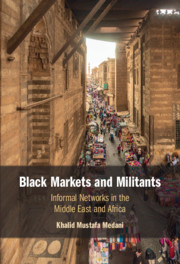Book contents
- Black Markets and Militants
- Black Markets and Militants
- Copyright page
- Dedication
- Contents
- Figures
- Tables
- Acknowledgments
- Preface
- I The Framework
- II The Institutional Context in an Era of Abundance
- III Globalization and Institutional Change in an Era of Scarcity
- 4 Economic Crisis, Informal Institutions, and the Transformation of Islamist Politics in Egypt
- 5 From Remittance Economy to Rentier State: The Rise and Fall of an Islamist Authoritarian Regime in Sudan
- 6 State Collapse, Informal Networks, and the Dilemma of State Building in Somalia
- 7 The Political Economy of Radicalization: Informal Networks and the Rise of an Urban Militant Islamism in Cairo
- Conclusion
- Book part
- Notes
- Bibliography
- Index
7 - The Political Economy of Radicalization: Informal Networks and the Rise of an Urban Militant Islamism in Cairo
from III - Globalization and Institutional Change in an Era of Scarcity
- Black Markets and Militants
- Black Markets and Militants
- Copyright page
- Dedication
- Contents
- Figures
- Tables
- Acknowledgments
- Preface
- I The Framework
- II The Institutional Context in an Era of Abundance
- III Globalization and Institutional Change in an Era of Scarcity
- 4 Economic Crisis, Informal Institutions, and the Transformation of Islamist Politics in Egypt
- 5 From Remittance Economy to Rentier State: The Rise and Fall of an Islamist Authoritarian Regime in Sudan
- 6 State Collapse, Informal Networks, and the Dilemma of State Building in Somalia
- 7 The Political Economy of Radicalization: Informal Networks and the Rise of an Urban Militant Islamism in Cairo
- Conclusion
- Book part
- Notes
- Bibliography
- Index
Summary
Chapter 7 explains how militant Islamist leaders adapted “traditional” Egyptian rural norms in ways that allowed them both to supplant the political power of local notables, while simultaneously institutionalizing extortion practices and implementing their own brand of “law and order.” Islamic militants exploited the high levels of social and economic uncertainty in Cairo’s informal housing areas. An important reason behind the popularity of radical Islamists among local residents is due to the ways in which their leaders have utilized highly coercive methods to settle local disputes and enforce informal labor contracts for their members, while simultaneously preaching against the ills of conspicuous consumption in their sermons and imposing strict Islamic modes of conduct. The chapter shows how the socio-economic conditions that have served, as a “recruiting ground” for Islamist radicals was made possible as result of economic change at both the international as well as domestic level.
Keywords
- Type
- Chapter
- Information
- Black Markets and MilitantsInformal Networks in the Middle East and Africa, pp. 263 - 313Publisher: Cambridge University PressPrint publication year: 2021

